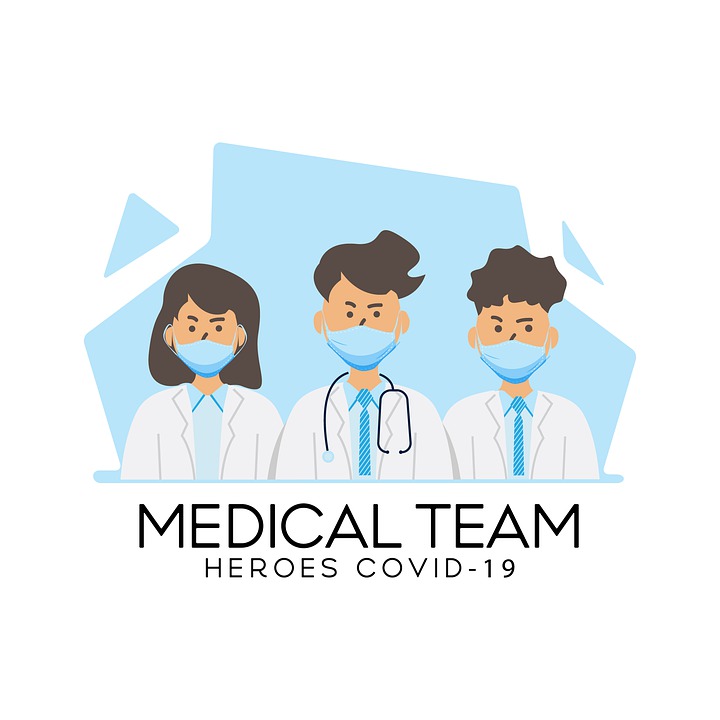The COVID-19 pandemic has sparked a media narrative of healthcare workers as ‘heroes.’ Although well-intentioned, calling healthcare workers ‘heroic’ can have unintended negative consequences. In a new article, featured in the Journal of Medical Ethics, Caitríona L. Cox, of the Healthcare Improvement Studies (THIS) Institute, examines some of these consequences.
Cox explores how this narrative leads to a failure to recognize the limits of the duties of healthcare workers, a lack of recognition of the role the public and governmental institutions have in combating the pandemic, and negative psychological impacts on healthcare workers. Cox writes:
“Individual heroism does not provide a firm basis on which to build a systematic response to a pandemic: there must be recognition of the responsibilities of healthcare institutions and the general public.”
 Heroes are broadly understood as individuals who engage in actions in the service of the greater good, or something greater than themselves, also referred to as ‘supererogatory action’ in the research literature. Heroism goes beyond just these acts; however, as supererogatory action includes things such as giving money to charity, which is not typically considered heroic. Additional criteria for heroism include it being a voluntary act, and it usually involves some degree of personal risk or sacrifice in the service of the other.
Heroes are broadly understood as individuals who engage in actions in the service of the greater good, or something greater than themselves, also referred to as ‘supererogatory action’ in the research literature. Heroism goes beyond just these acts; however, as supererogatory action includes things such as giving money to charity, which is not typically considered heroic. Additional criteria for heroism include it being a voluntary act, and it usually involves some degree of personal risk or sacrifice in the service of the other.
The day-to-day duties of healthcare workers can be considered to be heroic outside of a pandemic, as they are routinely confronted with situations wherein they help others despite personal risks, such as being exposed to infectious diseases like hepatitis or tuberculosis. Healthcare workers are aware of and accept these risks as part of the job – yet, they have not been widely praised as heroes in the media before the pandemic.
Looking at what has changed that has given rise to more widespread recognition of healthcare workers as heroes, Cox points to the increased risks that healthcare workers are faced with during the pandemic. She also highlights costs other than the risk of infection, such as encountering challenging ethical dilemmas, the physical and psychological toll of working through the pandemic, losing patients and colleagues to COVID-19, and for some, having to live apart from vulnerable loved ones for extended periods.
The lived experience of many healthcare workers having to leave home for work drastically differs from the messages to stay at home that the general public has received about how to handle the pandemic. This, coupled with the use of military-style language to describe healthcare workers as ‘combating’ and ‘battling’ the virus, makes it clear to see how the narrative of the healthcare worker as the hero has become so prominent.
Although healthcare workers do indeed fit the mold for the hero role, there are several problems with viewing them in this way. Cox describes how labeling healthcare workers as heroes prevent meaningful discussion about the limits of their duty to care for patients from occurring. It does not allow for exploration into the expectations and obligations of healthcare workers during a pandemic.
She argues that there needs to be a consensus developed as to what degree of personal risk healthcare workers are being asked to place themselves under. Although this topic has not been wholly ignored – for example, vulnerable healthcare workers who have underlying medical conditions have been cautioned to avoid face-to-face contact with patients – there needs to be a further exploration into how we can negotiate the boundaries of healthcare workers in the face of COVID-19.
Additionally, lauding healthcare workers as heroes ignores the vital roles that the public, healthcare institutions, and the government have in addressing the pandemic – it is not a one-sided fight. The purpose of healthcare institutions is to protect and support their employees by taking actions such as providing adequate personal protective equipment (PPE), clearly communicating risks and expectations to their employees, providing training and other needed resources, providing access to treatment if workers become infected, making therapy and psychological support available, and providing support, including financial compensation, to family members if workers die.
The general public’s responsibility lies in both taking measures to reduce spread, such as by staying home, following social distancing guidelines, and wearing face coverings when in public, but also outside of times of crisis, such as through paying taxes and voting for elected officials that will support the healthcare system.
The media’s emphasis on healthcare workers as heroes draws the focus away from the crucial responsibilities of the public, and healthcare and governmental institutions have to support healthcare workers. This, in turn, prevents healthcare workers’ needs from being met. We have seen this in repeated cries for adequate personal protective equipment (PPE) by healthcare professionals throughout the pandemic. Cox writes:
“Media coverage which praises heroism among healthcare workers diverts attention away from the critical importance of ensuring that reciprocal social obligations to healthcare workers are fulfilled; as Reid notes, ‘the obligation to noble self-sacrifice seems incompatible with insisting on proper protective equipment.’”
She highlights how, during the SARS epidemic, the hero narrative was used as a political tool to divert attention away from the errors made by the government in its response to the outbreak. The focus on the selfless sacrifice of healthcare workers neglects to emphasize the moral duties that the public and institutions have to support these workers, nor does it acknowledge that these societal obligations are crucial to healthcare workers being able to fulfill their duties.
These moral duties do not only pertain to the support of healthcare workers, but our vulnerable populations as well, such as the homeless, those in jails and psychiatric institutions, and other marginalized individuals. All of them have experienced increased challenges and risks of infection due to the pandemic.
Cox also directs attention to the negative psychological effect that being referred to as heroes can have on healthcare workers:
“We cannot ask all healthcare workers who go to work to accept personal risk beyond what is reasonably expected of them, as it is simply too demanding; we cannot, in short, expect heroism.”
A study involving American physicians found that only 55% of them agreed that they are obligated to place their health at risk during an epidemic, and a study that included British healthcare workers found that 26% disagreed that they should have a duty to work even when confronted with high risk. Therefore, it is crucial to recognize that some healthcare workers might feel that they are being pushed beyond the boundaries of what they agreed to when they entered this line of work. It is unfair and unreasonable to expect heroism.
Moreover, expecting heroism fails to recognize and attend to the genuine fears and anxieties faced by healthcare workers. Healthcare workers are negatively psychologically impacted by COVID-19, and we must acknowledge their suffering and provide them with the support that they need.
Others have highlighted how healthcare professionals have a heightened risk of long-term emotional distress following quarantine due to their increased exposure to COVID-19 and have called for increased availability of mental healthcare for these individuals.
Further demonstrating the negative impact of being called heroes can have on healthcare workers, those in the healthcare industry have expressed feeling uncomfortable with this label. The unrealistic expectations of all healthcare workers as heroes and undue pressure this places on those working in the field brings to light the need for the media to reconsider using this term.
Cox ends her review with a call for meaningful action to be taken to support our healthcare workers better:
“Rather than praising all healthcare workers as heroes and clapping them every Thursday, we need to critically examine, as a society, what duties we think healthcare workers have to work in this pandemic, what the reasonable limits to these duties are and how we can reciprocally support them.”
****
Cox, C.L. (2020). ‘Healthcare Heroes’: problems with media focus on heroism from healthcare workers during the COVID-19 pandemic. Journal of Medical Ethics, 0, 1-4. (Link)















This was Birmingham UK centre yesterday – young people are not having it:
https://youtu.be/_RIq-izcLXk?t=344
Report comment
“Healthcare workers are negatively psychologically impacted by COVID-19, and we must acknowledge their suffering and provide them with the support that they need.”
Everyone is “negatively psychologically impacted by COVID-19,” especially all those people who lost their jobs, which the healthcare worker did not.
“Others have highlighted how healthcare professionals have a heightened risk of long-term emotional distress following quarantine due to their increased exposure to COVID-19 and have called for increased availability of mental healthcare for these individuals.”
I wouldn’t wish that on my worst enemy, including the mainstream doctors who have bought into the “bullshit” and “invalid” DSM “mental healthcare” theology, who are murdering 8 million innocent people every year.
https://www.wired.com/2010/12/ff_dsmv/
https://www.nimh.nih.gov/about/directors/thomas-insel/blog/2013/transforming-diagnosis.shtml
https://www.nimh.nih.gov/about/directors/thomas-insel/blog/2015/mortality-and-mental-disorders.shtml
“those in the healthcare industry have expressed feeling uncomfortable with this label. The unrealistic expectations of all healthcare workers as heroes and undue pressure this places on those working in the field brings to light the need for the media to reconsider using this term.”
I agree, especially given the staggering number of iatrogenic induced deaths the medical industry – particularly the “mental health” industry – is participating in every year. Our doctors are not heroes, except perhaps the few who are speaking out against the COVID-19 propaganda – and the few who are speaking out against the fraud of the “mental health” industries – many of whom are being immediately and permanently censored from the internet.
Report comment
“Leading psychiatrists have urged the government to boost public resources for youth mental health to tackle an association between depression or anxiety and sympathies with violent protest and terrorism.”
https://www.theguardian.com/society/2020/jun/29/boost-nhs-mental-health-youth-services-to-tackle-radicalisation-say-psychiatrists
“We think that if you suffer from depression, PTSD or anxiety, it increases your risk of wanting bonding capital,” said Jones. “That is, identifying people like yourself because it will give you a sense of protection, social identity and belonging. Of course, the radical groups fall into that category. Instead of feeling you belong to, say, Manchester, you belong to a very defined group who have radical views. Because it gives you a sense of wellbeing, it gives you a short-term antidote to this feeling of depression and worthlessness and being threatened.”
https://www.nhs.uk/conditions/post-traumatic-stress-disorder-ptsd/treatment/
‘paroxetine and sertraline are licensed specifically for the treatment of PTSD.’
If there were any drugs that are most dangerous re Akathisia/Toxic Psychosis it is those two.
Report comment
Check out Vernon Coleman’s blog. https://vernoncoleman.com He is an outside the box thinker. Argues that modern meat is unsafe to consume, criticizes the lockdown, and condemns modern medicine for pushing SSRI’s on everyone they can.
He left medicine (MD) to write books a while back. Reminds me of Peter Breggin a little. Same generation. I wonder if he’d write for MIA.
Report comment
Thanks Rachel, yes indeed I watch him for any new insights . Note they push non drug interventions first on the NHS website for treatments. Nobody gets that straight away, they get drugs straight off.
For those of you who maybe new to this you can see the suicide murder chart in the paxil (paroxetine) trial here:
https://www.baumhedlundlaw.com/prescription-drugs/paxil-injuries/paxil-trial-exhibits/
“When it comes to suicide attempts, GSK did not keep track of all the attempted suicides in their clinical trials because, according to their company witness, it would be too burdensome.”
And here is David Healy talking about the Death of Stephen O’Neill who was on Sertraline:
https://www.youtube.com/watch?v=qdljt27WjfU
Report comment
I absolutely agree, COVID-19 does relate to the fraud of the globalist banking system, and their destruction of our formerly free market capitalist system. “We should be talking about systems, not about people.” Absolutely, the systems are the problem.
Report comment
Covid-19 is being used for two things. Selling a vaccine that’s probably just a placebo. And propaganda.
They say they should have it out in a year so we should just stay home till then. Really? AIDS has been around for well over 30 years and there’s no vaccine for that virus yet. I’m sure Gates and Big Pharma will be handsomely paid after keeping the populace isolated and fearful for months on end.
It also makes great propaganda for Big Brother rising up from the depths of the sea. Every great tyrant knows the best populace is a divided one where everyone distrusts and fears their neighbor. Hysterical fear of a possible infection with a small chance of dying is a great way to turn us all against each other. A bunch of selfish, cowardly misanthropes with no social support except the evening news and “social” media is very easy to control.
I’ve already promised myself if I see an elderly person passing out from the stupid mask at WalMart I’m going to help them. Yeah, I know it means exposing myself. So?
Better to die from the virus (unlikely as that is) than live on as one of those caricatures who beats up little old ladies for coming within five feet (the old lady is way more apt to die than a 30 year old if she’s infected.) Or one of those killjoy “karens” who drives around looking for children to scream “I hope you all get Covid-19 and die!” at because they’re playing in the park. A school teacher was doing this. 😛 Or one of those people who doesn’t know their grandma died till six months after since they never made phone calls and rejoiced at the pandemic since they had an excuse to quit visiting her nursing home. Or–speaking of the medical profession–that doctor near me in Louisville who assaulted a teenage girl (choking her) for the horrible crime of enjoying a sunset in the park.
None of these behaviors are rational. If you’re so worried over infection why run toward the person for further contact as you try to punch or throttle them? These activities require touching the person. If you’re worried over their safety why scream how you hope they die?
Covid-19 offers a great excuse to act like selfish jerks. Many are taking advantage of the situation.
If this were the next Bubonic Plague (it isn’t) it still wouldn’t justify these behaviors. There are fates far worse than death. Like losing our humanity.
Report comment
Stephen Harrod Buhner [interviewed here on MiA: https://www.madinamerica.com/2017/01/understanding-extreme-states-interview-stephen-harrod-buhner/ is not a part of the medical industrial complex and has been studying and writing about viruses like the coronaviruses and bacterial infections like Lyme for some time. This is his technical take on this virus, with plant-based interventions (to emphasize, intervention does not = cure):
https://www.stephenharrodbuhner.com/wp-content/uploads/2020/05/coronavirus-1.pdf
It certainly doesn’t excuse the behaviors you described above, but COVID-19 is much more than “a possible infection with a small chance of dying”.
Those interested can help on a local or state level by looking up and supporting community herbalists, apothecaries, aid collectives, and free clinics providing on the ground mutual aid (like hand sanitizer, chest rubs, salves, immune-supporting teas/tonics, etc.) to folks in need. There are more and more of these organizations popping up internationally in response to this crisis.
Report comment
Removed for moderation.
Report comment
Song stuck in my head since this blog…
https://www.youtube.com/watch?v=a7SouU3ECpU
Report comment
Any medical ethicist who does not vehemently oppose and speak out against psychiatry should be fired. Calling doctors, nurses, social workers etc “heros” who are complicit in having people tortured, in having them arbitrarily detained, in lying to them about the nature of their problems, in offering them incredibly dangerous treatments they don’t actually need, is so beyond unethical it’s embarrassing it even has to be spelled out.
Psychiatry killed my hero, a famous actor and singer. A friend of mine knew him personally. He was forcibly treated on and off over a ten year period, for grief and overwork. When I learned how he died and what had been done to him I almost collapsed. They took this achingly beautiful, sensitive, compassionate, generous, talented man and made him so sick from pills he couldn’t stand up without help; they gave him akathisia; they lied to him about the nature of his problems which eventually led to a hack journalist outing him for having been locked up, smearing his good name permanently and into perpetuity; they gave him drugs that caused him to gain so much weight in water retention at one point they drained fifty pounds FIFTY POUNDS of water off his body in one day in order to continue filming a show he starred in. And when at one point he demanded his release after being detained against his will he was told, like everyone else in such situations, that the mere fact he wanted to be released was a sign that he was “mentally ill” and reason enough to keep holding him in hospital.
And to this day you can find fans of his saying things like “at least he was seen by psychiatrists or he might have died sooner”. Even when they kill people still the myth remains that doctors are benevolent.
Report comment
And yet another one for medical ethicists someone I know recently told me that he is going blind and will need a certain eye treatment to prevent that happening and due to cuts by government he was told that the eye doctors were told to tell people to pick one eye to save.
I think it has to be the most disturbing abuse in health care i have ever heard of in my life.
Report comment
All right! A namesake (I don’t know her) steps up to make a statement!
I have heard soldiers cringe at this label as well.
I see it as a kind of PR stunt – almost cheap – like an attempt at flattery. Whose intentions are more in question when obvious flattery is involved? Those of the flatterer, of course!
Here in California, the signs being stuck in people’s lawns with these messages are being provided by the health care corporations themselves. In a sense they say, “Sorry, that’s all you’re going to get out of this. We can’t afford to raise your pay or give you better benefits, so better be happy with a pat on the back.”
I’ve stood in the shoes of a relief worker. Sure, they can be considered special people. But what’s on most of their minds is: Am I doing the best job possible for the people I’m serving? In this sense, training, good organization, confident leadership, and proper infrastructure are much more important to these people than a pat on the back.
Report comment